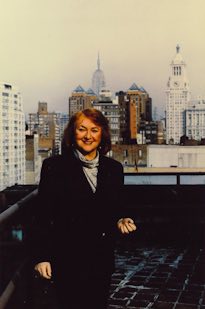In 1984, Dr. Eleanor K. Baum became the first female engineer to be named dean of an engineering college in the United States, breaking many professional gender barriers along the way.
Dr. Baum’s career as an engineer began at City College of New York where she was the only female in the 1959 engineering class. “I felt very conspicuous,” she said, “but I was stubborn enough to stick it out.” Later she earned both her masters degree and Ph.D. in electrical engineering from Polytechnic Institute of New York.
During this time, she discovered a love for teaching that became a life-long passion. She began her teaching career as an assistant professor at Pratt Institute in Brooklyn. Her subsequent appointment to chairperson of the electrical engineering department was an historic achievement.
In 1987, Dr. Baum moved her career across town to Cooper Union. As Dean of the Albert Nerken School of Engineering at Cooper Union in Manhattan and Executive Director of the Cooper Union Research Foundation, she spent over twenty years vigorously promoting engineering as a profession, particularly for women.
Recognizing the stereotypical image of the white male engineer, Dr. Baum worked to dispel such thinking by actively encouraging young women and minorities to pursue careers within the profession.
When she became dean at Cooper Union, 5% of the student body was female. Under Dr. Baum’s leadership, that number increased to 40%. Dr. Baum is committed to recognizing the importance of positive engineering and female role models for high school and college students.
She belongs to several professional organizations that share those convictions. In 1995, she was elected president of the American Society for Engineering Education, another first for a woman. She is an active member of the Society of Women Engineers and has served as national president of the Accreditation Board for Engineering and Technology.
In 1996, Dr. Baum was inducted into the Women in Technology International Hall of Fame. A frequent writer and speaker on educational and engineering issues, she is the author of many professional articles; a director on several business, professional, and college advisory boards; holder of more than 20 awards and citations; and five honorary doctorates from major colleges and universities, including Notre Dame University and Union College.

